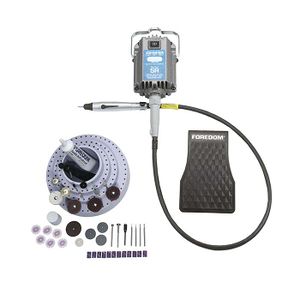Power Carver
Make: Foredom
Model: SR - K5200 Deluxe
Serial Number: I180359
Ace: Needed (Makerhub@georgefox.edu).
Location: Wood Shop
Safety First
- Remember that a carving tool that can remove wood can also remove flesh.
- Always unplug the motor before changing out tools. Keep your hands away from spinning cutters.
- It's good practice to carve along the grain and try to avoid removing material too quickly, which can cause the tool to slip.
- When working with larger tooling make sure to clamp your project down.
- Avoid loose clothing or hair, which can get caught in moving bits.
- Power carving can produce flying particles, so it's important to protect your eyes.
- The dust produced is not good for your lungs so avoid breathing the dust and make sure the air filters are turned on.
Description
The power carver consists of hand piece that is driven by a motor. The motor is connected via flexible shaft that allows easy movement of the hand piece without the weight of the motor. There are many cutting tools available for use with the hand piece. Some of the uses include sanding, carving, and cutting. The most common uses are creating custom designs in wood and polishing small projects.
Here is an example of this piece of equipment being used.
Documentation
Terminology
Hand-Piece- The part of the power carver that attaches to the cutter.
Flex Shaft- The flexible cable that transfers the motor power to the hand piece.
Training
Operation
The Foredom uses a stand that is connected to the table. You will need to clip the motor hanger bracket to the clip on the stand. This will allow the stand to carry the weight of the motor. The preferred hand piece will need to be selected and installed as well as the desired tool. The tools are captivated by the collet located inside the hand piece. To lock the shaft find the hole located on the side of the hand piece. Install the locking pin into the hole so the shaft can't turn. You will now be able to use the wrench to loosen the collet. Install the tool and reverse the process to lock the tool in place. Make sure to remove the locking pin before trying to run the motor.
Demonstration
You will need to safely demonstrate setting up the Foredom. Connect the motor bracket to the hanger and change out a tool. Place the pedal in a comfortable position and plug in the power cord. Explain the dangers involved in operating this tool. Select the direction switch to indicate the proper rotation direction. Using a scrap piece of wood carve a simple design.
General Procedure
Basic Setup 1. Connect the motor bracket to the stand clip if not already done.
2. Remove and install the desired handpiece if needed. See video for removal and installation. Make sure the shaft key is properly aligned before installation.
3. Change the tool if needed. Use the locking pin and wrench to tighten and looses the collet. Make sure to remove the locking pin when done.
4. Place the variable speed foot pedal at a comfortable position on the floor.
5. Plug in the power cord.
6. Set the motor direction switch for proper rotation direction. Most tools should be used in the forward direction. Ask if you are unsure about the motor direction.
7. Make sure you have a good grip on the handle before pressing the foot pedal as the cutting tool will begin to spin. The speed of the tool is proportional to the travel of the foot pedal.
Certification
Troubleshooting
If a tool is not cutting make sure it is turning the correct direction. Running a tool backwards will cause burning and damage to the tool.
Maintenance
General maintenance
Keep the motor and flex shaft clean. Wipe down or vacuum as needed.
Specific Maintenance Tasks
| Maintenance Procedure | Frequency | Done By |
|---|---|---|
| Grease Shaft | Technician | 50 Hours |
